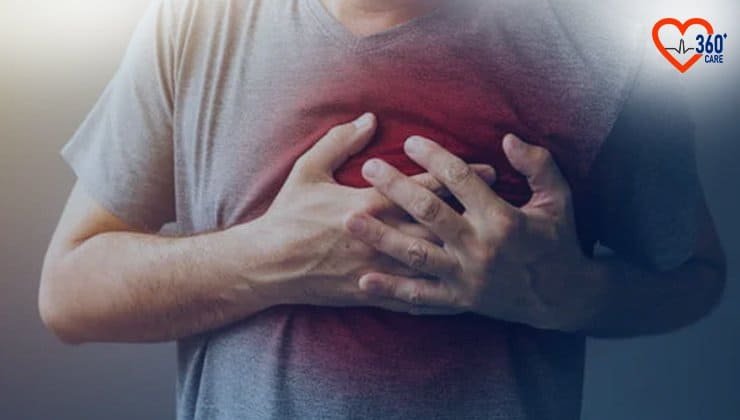Heart attack is one the leading causes of death worldwide and is a medical condition that requires immediate attention. Golden hour is the first hour after the heart attack that has emerged as a critical time frame during which a quick and appropriate medical intervention may enhance the chance of survival of the patient.
Keep reading further to know more about the golden hour in heart attack and its significance!
What is Heart Attack And Its Symptoms?
A heart attack may occur if the blood supply to the heart is disrupted by a blood clot that obstructs the coronary arteries. This deprives the heart muscle of vital oxygen and nutrients.
Common causes of heart attack include coronary artery disease and risk factors, including high blood pressure, high cholesterol, diabetes, and smoking.
The important symptoms of heart attack are
- Pain/ heaviness or burning sensation in the center of the chest
- Discomfort and radiating pain in other areas of the upper body, including arms, back, neck, jaw
- Shortness of breath
- Profuse sweating, lightheadedness, or nauseous
- Sudden fatigue or weakness
Also, it is important to note that not all experience all the classic chest pain symptoms. In many circumstances, symptoms may not be obvious, and people may not act fast. So, timely medical check-ups may be required to prevent heart attacks.
What Is Golden Hour In Heart Attack?
Golden hour is the first hour (first 60 minutes) after the onset of a heart attack that requires appropriate action.
It is a window of opportunity that is critical and prompt medical intervention during the time can improve the outcomes and reduce the risk of severe damage to the heart muscle. It may eventually save a patient’s life.
Why Is The Golden Hour Most Critical?
The heart muscle will die within 80-90 minutes after the blood flow to the heart is stopped and therefore, the risk of complications rises significantly. The consequences will depend on the extent of the damaged heart muscles. The damage to the heart muscle may be irreversible after 12 hours.
So, every minute after a heart attack without treatment may increase the risk of permanent heart damage and subsequently, the patient will die. It has been observed that most deaths due to cardiac arrests may happen during the first few hours of a heart attack without medical treatment.
With the help of fast medical treatment within the first hour, surgeons may quickly open the narrowed artery and save most of the heart muscle. It will prevent permanent damage to the heart muscles. So medical intervention in the golden hour is critical.
How To Get Treatment In The Golden Hour?
- Recognize the symptoms: If you have risk factors associated with cardiac problems, including diabetes, hypertension, smoking, high cholesterol, or a family history of cardiac problems, try to know specialized hospitals that are located close to your home.
The individuals and the family need to recognize the signs and symptoms of heart attack and act immediately. Keep the emergency contact numbers of the ambulances and nearest hospitals.
- Seek emergency medical services: If you are suspicious of a cardiac problem, you may seek immediate medical help. Promptly call the emergency services and paramedics may provide immediate care and will take you to the nearest hospital with cardiac hospitals.
Avoid driving the car with cardiac symptoms as it may be dangerous.
- Medical intervention: Once at the hospital, you may be given medications, and diagnostic procedures, including angioplasty may be performed.
What To Do If A Person Suddenly Collapses?
If the person collapses, assist the person and position them. It is recommended to get immediate medical help and call an ambulance. If the person stops breathing, you may start CPR. Even if you have recovered, consult your doctor immediately to check for issues.
What Are The Treatment For Heart Attack?
The different treatments for heart attack that will help in restoring the blood flow to the heart are
- Coronary angiography: Helps in examining the blood vessels of the heart
- Angioplasty: A minimally invasive procedure that uses a balloon-tipped catheter to open the blocked artery
- Stent: A small mesh tube is placed inside the narrowed artery to keep it open.
- Coronary artery bypass graft: A surgical procedure to restore blood flow by creating a new pathway for blood flow and bypassing the blocked section of the coronary artery.
Conclusion
Golden hour in heart attack represents a critical window of opportunity after the heart attack that helps in improving the survival chances. Understanding the warning signs of heart attack and acting promptly in the golden hour can reduce the risk of complications.
Public education on symptoms of heart attack and the importance of golden hour is vital for patients to receive timely treatment. If you have any queries about heart attack symptoms, golden hour, and treatment options, you may book an appointment with Dr. Nikhil P.J. Theckumparambil of Heart360 Care for cardiac care.
Frequently Asked Questions
If you think you or someone else is having a heart attack or showing symptoms, it is essential to contact your emergency services. Otherwise, contact someone to drive you to the nearest hospital. Drive only if you don’t have any other option and monitor symptoms carefully. You may take aspirin or nitroglycerin if recommended. Start CPR if the person doesn’t have a pulse.
The life expectancy after a first heart attack may vary widely based on several factors, including severity of heart attack, age, overall health, lifestyle changes after heart attack, and medical treatment. Approximately, about one in five men (20%) who had a heart attack died within one year. Also, a second heart attack occurs in 13% of men and in 40% of women within 5 years of the initial attack.
The golden time for CPR is the critical period immediately after cardiac arrest when immediate CPR may increase the chances of survival and reduce brain damage. After correct CPR, the survival rate may be 30-50% in areas with advanced emergency systems. After 10 mins, the survival rate may be reduced and less than 1%.
Women may have these symptoms of heart attack, including pain in the neck, jaw, shoulder, upper back, or upper stomach. There may be shortness of breath, pain in one or both arms, nausea or vomiting, sweating, lightheadedness, unusual fatigue, and heartburn. These symptoms are more noticeable than chest pain.
Heart attacks can be prevented by eating a healthy, balanced diet, reducing alcohol consumption, exercising regularly and keeping a healthy lifestyle, giving up smoking, keeping the blood pressure under control, diabetes under control, and taking prescribed medicine.









